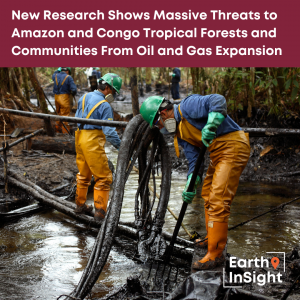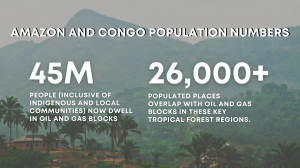New Report Shows Massive Threats to Amazon and Congo Tropical Forests and Communities From Oil and Gas Expansion
An Area Six Times the Size of the UK Threatened and Tens of Millions of Indigenous and Local Community Members at Risk
SACRAMENTO, CALIFORNIA, UNITED STATES, December 15, 2022 /EINPresswire.com/ -- According to new research in a report released at the UN Biodiversity COP 15, oil and gas expansion in the Amazon and Congo Basins is a rapidly accelerating existential threat to global climate stability and biodiversity, and to tens of millions of Indigenous People and local communities who live inside areas slated for oil and gas exploration and development. This new report titled Crisis Point: Oil and Gas Expansion Threats to Amazon and Congo Basin Tropical Forests and Communities is published by Earth InSight, and the findings underscore the global need for an end to all oil and gas expansion – especially in these and other critical forest basins and ecosystems.Key findings show that:
Amazon and Congo Basins Combined:
-Over 330 million acres (135 million hectares) of undisturbed tropical forest – an area nearly six times the size of the United Kingdom – has been designated as oil and gas blocks (areas already in production or under exploration)
-More than 20% of the total population in these regions or up to 45 million people (inclusive of Indigenous and local communities) now dwell in oil and gas blocks
-More than 26,000 populated places (villages, towns, cities, etc.) overlap with oil and gas blocks in these key tropical forest regions.
-Over 500 distinct Indigenous nationalities call the Amazon Basin home and more than 25 million hectares of Indigenous Territories are now in oil and gas blocks
-Over 150 distinct ethnic groups call the Congo Basin home and more than 20% of populated places in Congo Basin countries, are now in oil and gas blocks.
“We must not let a chaotic expansion of fossil fuels risk our precious tropical forests, biodiversity hotspots, and the rights and livelihoods of forest communities who are already feeling the impacts of climate change. With a focus on realizing our potential in renewable energies, Africa and Congo Basin countries can lead the way to a prosperous green future”, says Francois BILOKO, General Secretary of Réseau CREF, a leading environmental network in the Congo Basin
“Indigenous peoples have stewarded and helped keep Amazonia in balance for thousands of years. Oil and gas expansion is one threat among many types of industrial extractivism to the Indigenous People and cultures, forests, lands, and rivers of our rainforest. Put simply, there is no place for new oil and gas drilling in the Amazon if we are to preserve the integrity of our rainforests and if the rights of Indigenous People are to be respected,” says José Gregorio Díaz Mirabal, Coordinator General of COICA, the Pan-Amazonian Indigenous Federation
“We are in the midst of a climate and biodiversity emergency. Time is running out and bold action is required to address the scale of the challenge we face. An immediate moratorium on oil and gas expansion and industrial activity in priority forests and ecosystems is essential. The Amazon and Congo Basins and other critical regions must be prioritized for preservation along with the expansion of rights, territories, and direct funding for Indigenous and local communities,” says Tyson Miller, Director of Earth InSight
Time Still Remains and Solutions Exist
Oil and gas drilling is a gateway to deforestation. New policies and financial mechanisms are critical to stop oil and gas expansion in critical areas. Solutions include:
-A moratorium on all industrial activity in primary and priority forests in order to safeguard critical ecosystems
-Expansion of global Indigenous rights and territories
-The Amazonia for Life: 80% by 2025 Declaration from Indigenous federations across the Amazon
-Commitments from banks and financial institutions to stop financing oil and gas expansion
-Increased country-level commitments to the principles of the Beyond Oil and Gas Alliance
-The UK government’s 10-Point Plan for Financing Biodiversity now endorsed by 20+ countries
-Widespread commitments to the Fossil Fuel Non-Proliferation Treaty
-Unlocking the vast potential in renewables and scaling up direct support to forest communities and other frontline forest defenders.
The Crisis Point report was released during UN Biodiversity COP 15 – the international gathering of world leaders designed to address the biodiversity crisis. It offers a stark reality check regarding the threat that oil and gas expansion plans pose to the world’s two largest tropical rainforests and the Indigenous and local communities who live within them. This research also builds on findings that were co-published with Rainforest Foundation UK in Congo in the Crosshairs and released at the UN COP 27 climate conference earlier in the year. It also builds upon the excellent research of RAISG and the Amazonia Under Pressure series as well as Amazonia Against the Clock published by the Amazonia for Life: 80% by 2025 coalition.
UN Press Conference Video Link Here: https://www.youtube.com/watch?v=9fbUnQBemmk
#
Media Contacts:
At COP 15: Tyson Miller, Executive Director: +18282792343 / tyson@earth-insight.org
General: Susan Hassol, Climate Communication, susan@climatecommunication.org
Media interviews with Amazonian and/or Congolese partners available upon request
Tyson Miller
Earth InSight
tyson@earth-insight.org
Visit us on social media:
Twitter
LinkedIn
Legal Disclaimer:
EIN Presswire provides this news content "as is" without warranty of any kind. We do not accept any responsibility or liability for the accuracy, content, images, videos, licenses, completeness, legality, or reliability of the information contained in this article. If you have any complaints or copyright issues related to this article, kindly contact the author above.



